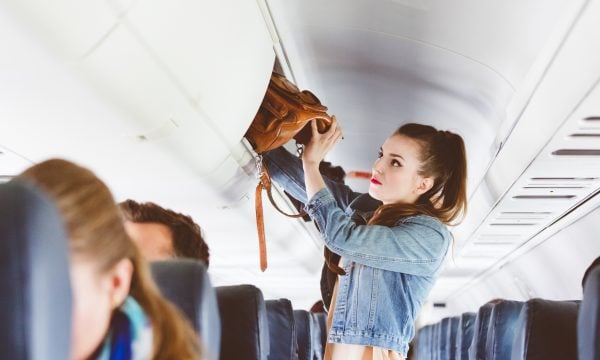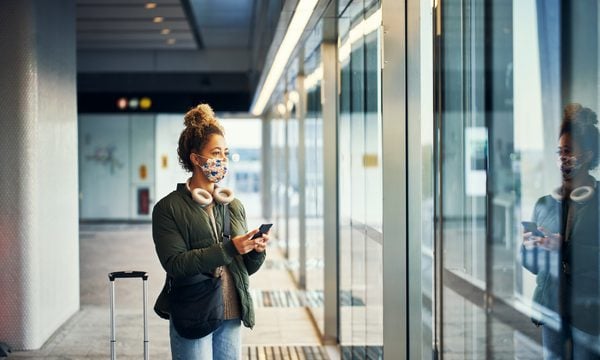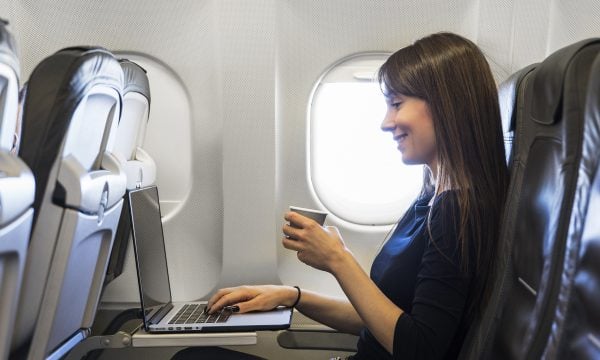Should I Book Skiplagged Flights?
Skiplagged took the hidden-city ticket mainstream, but be careful — airlines have taken notice.

Many or all of the products on this page are from partners who compensate us when you click to or take an action on their website, but this does not influence our evaluations or ratings. Our opinions are our own.
Flying can be expensive. Because of consolidation between the U.S. airlines, there is a lot less competition on some routes, leading to even higher prices on those trips. But, what if you could pay less to fly on the exact same flight?
Enter Skiplagged. This service finds "hidden city" tickets — which means you buy a ticket with a layover in your desired destination and instead of getting on the second flight, you just take your carry-on suitcase and leave the airport. This method can help you book a flight for a lot cheaper than if you simply had booked a ticket to your desired destination. So, what can go wrong? It turns out a lot. Let's dig into the pros and cons of Skiplagged.
What is Skiplagged?
Skiplagged is the most well-known service for finding "hidden-city" or "throwaway" tickets. That's the practice of booking a less-expensive flight option without planning to fly the entire itinerary. Instead, you bail at a connecting airport rather than continuing to your final destination.
Although some travelers have been booking these types of tickets for decades, Skiplagged took the idea mainstream. And Skiplagged was so successful in finding lower fares for travelers that United Airlines sued the website in 2014. The Skiplagged founder raised over $80,000 for his legal fees and a judge ended up dismissing the lawsuit. Plus, the publicity made Skiplagged even more well known.
Get the 'Cheat Codes' to Cheaper Travel
Unlocking the secret to saving a ton on travel is easier than you think. 📤 Our free newsletter shows you how in 5 min. or less.

How to use Skiplagged
Skiplagged searches for the route you want to take and then looks to see if there are cheaper options on the same route by booking an onward flight. The example Skiplagged uses is a flight from Atlanta to Orlando costing $250, but a flight from Atlanta through Orlando to Dallas costing $130. By booking the second flight option, you almost cut your cost in half.
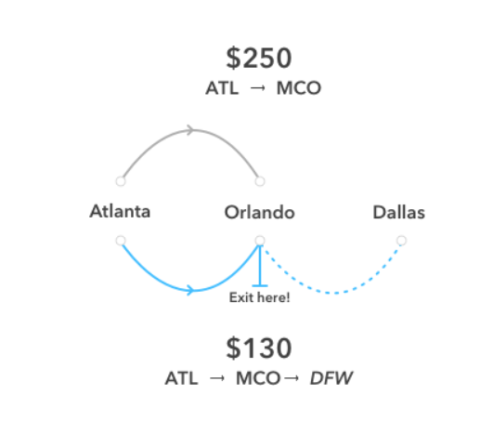
Airlines often charge extra to fly on nonstop flights. One stark example of this is found on transcontinental flights. For example, when we checked for a nonstop flight from San Francisco to Newark on Sept. 9, the cost was $268 one way in basic economy, or $298 for standard economy.
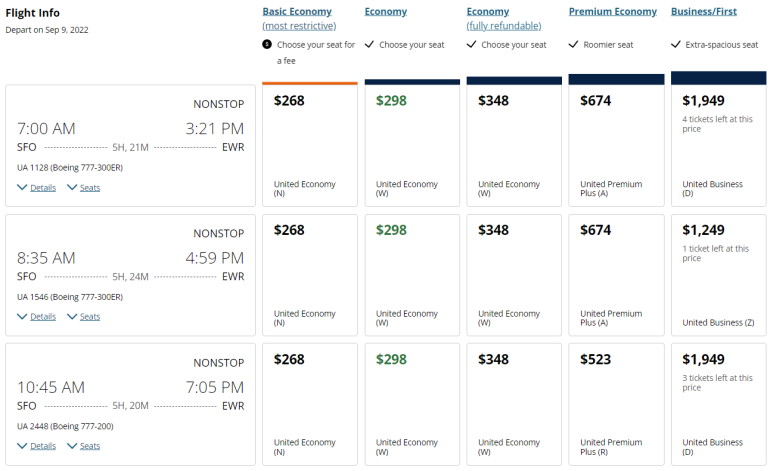
However, searching through Skiplagged, you could have booked a "nonstop" on the same route for just $144 one way. You just need to book it as a flight from San Francisco to Charleston routing through Newark.
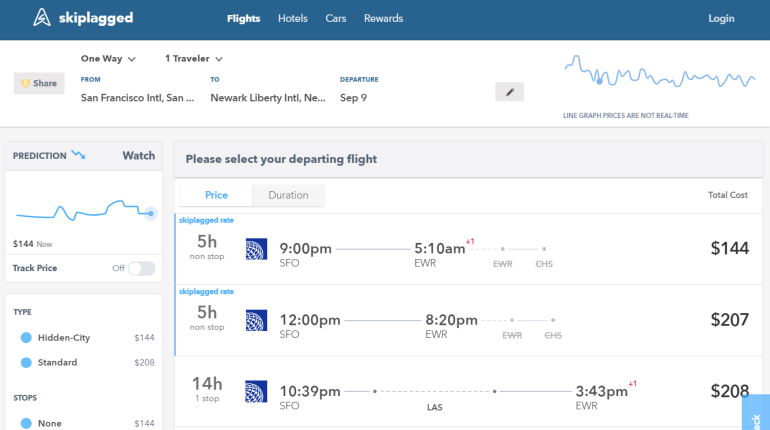
Is Skiplagged legit?
Skiplagged is a legit way to reduce the cost of certain flights. By booking a hidden-city ticket, you might be able to save hundreds of dollars off the cost of a flight.
Understandably, airlines hate this practice and have tried to get it shut down. That's why United Airlines and Orbitz teamed up to sue Skiplagged back in 2014. When they lost their legal battle with Skiplagged, airlines turned their attention to punishing passengers for engaging in this practice.
And this leads to why you should be careful about using Skiplagged. Even if you can save some of your hard-earned money, there are several downsides to hidden-city and throwaway ticketing.
Saving hundreds of dollars on a flight is undoubtedly appealing. However, booking a Skiplagged hidden-city ticket comes with several risks. These include hassles from having to carry on a bag up to significant issues like potentially forfeiting all of your airline miles.
No checked bags
You shouldn't check a bag when flying on a Skiplagged ticket. That's because your checked bag will be tagged through to your final destination — a destination you aren't going to. And no, you can't just convince the check-in agent to just check it through to your actual destination. That's a huge red flag for these agents and will likely lead to some additional scrutiny.
The only exception to the no-bag rule is when both of the following are true:
- Your intended destination is also your first U.S. airport after an international flight.
- You don't clear immigration and customs at a Customs and Border Protection Preclearance facility before your flight.
In this case, you can collect your checked bag to clear customs when arriving in the United States. Then, you can skip over the bag recheck area after clearing customs. But even in these cases, it's still not a good idea to check a bag.
No round-trip flights
When booking a Skiplagged ticket, you aren't going to be able to book a round trip. That's because the airline will cancel all of your remaining flights once you miss your first flight.
Say you want to fly from Atlanta to Paris. You might find a cheaper itinerary from Atlanta through Paris onto Budapest. However, if you skip your flight from Paris to Budapest, the airline will cancel your flights home. And you won't be able to save them even if you were to make your way to Budapest for your flights home.
The lack of being able to book a round-trip flight can make Skiplagged impractical. One-way flights — especially international one-way flights — can be much more expensive than just booking a round-trip flight.
» Learn more: The best travel credit cards right now
Schedule changes can ruin your Skiplagged ticket
Airlines are constantly tweaking their flight plans. And these schedule changes can wreck your best laid plans.
For example, I booked a round-trip flight from Munich to New York connecting in Charlotte. In a schedule update a couple of months in advance of my flight, the airline canceled my Munich-Charlotte return flight. Instead, the airline routed me on a flight through London on the way to New York.
I personally don't risk booking throwaway tickets. However, this shows how a scheduled change could wreck a hidden-city ticket. If you booked this itinerary hoping to get a cheap flight from Munich to Charlotte, you'd be stuck on a flight through London to New York instead. The best you can do is request a refund because of the flight cancellation and rebook another option.
Getting on the airline's bad side
Many airlines expressly forbid hidden-city ticketing in the terms and conditions that you agree to when purchasing a ticket. Violating these rules won't mean a police officer meets you at the gate. What you're doing isn't illegal — it's just against the airline's rules. And that can come with consequences.
For one, your mileage account could get shut down. That would mean losing your accumulated miles and any elite status you have with the airline. To avoid this fate, even Skiplagged recommends that you don't put your mileage account on your ticket.
Not listing your frequent flier account means you'll lose out on mileage earnings and credit card perks, such as preferred boarding. That comes with its own set of downsides. Boarding last might mean having to gate-check your carry-on bag — which would then be checked to your final destination.
Some airlines have taken things further. American Airlines passengers report receiving a bill from the airline. That's something that the airline gives itself the option to do in the contract you agree to when booking a flight. Another American passenger reported being met at the airport by an agent to explicitly warn them against using Skiplagged tickets. Lufthansa went so far as to sue a passenger for using hidden-city ticketing, seeking thousands of dollars in damages.
Skiplagged flights recapped
Booking a hidden-city ticket is a legit way to save money by booking a cheaper flight that connects through your intended destination. And Skiplagged makes it as easy as ever to find these lower-cost throwaway tickets.
However, it doesn't come without potential consequences. Airlines have tightened their regulations to explicitly forbid hidden-city ticketing. If you break the rules enough, the airline might end up sending you a bill or even taking you to court to recuperate the savings.
How to maximize your rewards
You want a travel credit card that prioritizes what’s important to you. Here are some of the best travel credit cards of 2026:
- Flexibility, point transfers and a large bonus: Chase Sapphire Preferred® Card
- No annual fee: Wells Fargo Autograph® Card
- Flat-rate travel rewards: Capital One Venture Rewards Credit Card
- Bonus travel rewards and high-end perks: Chase Sapphire Reserve®
- Luxury perks: American Express Platinum Card®
- Business travelers: Ink Business Preferred® Credit Card
Article sources
NerdWallet writers are subject matter authorities who use primary,
trustworthy sources to inform their work, including peer-reviewed
studies, government websites, academic research and interviews with
industry experts. All content is fact-checked for accuracy, timeliness
and relevance. You can learn more about NerdWallet's high
standards for journalism by reading our
editorial guidelines.
Limited Time Only: Earn $1,000 Toward Travel!
Capital One Venture Rewards Credit Card 
Travel

For a limited time, the
Capital One Venture Rewards Credit Card is offering new cardholders an especially rich bonus: Enjoy $250 to use on Capital One Travel in your first cardholder year, plus earn 75,000 bonus miles once you spend $4,000 on purchases within the first 3 months from account opening - that’s equal to $1,000 in travel!
More like this
Related articles




